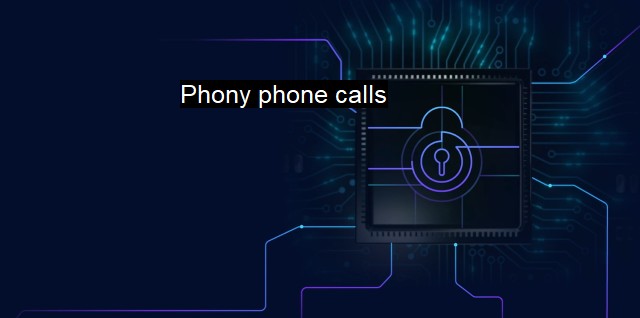What are Phony phone calls?
Protecting Yourself from Phony Phone Calls: The Threat of Caller ID Spoofing, Robocalls, and Scams
Phony phone calls, colloquially referred to as prank or spoof calls, are a ploy often employed by malicious individuals and entities seeking to extract sensitive data, information or money from unsuspecting users. Given the context of cybersecurity and antivirus, a phony phone call in this realm typically involves an individual pretending to represent a genuine organization such as antivirus vendors, Internet Service Providers (ISPs), or banks. In simple terms, these are scam calls.Similar to traditional phony calls made with the intention to fool the recipient, cybersecurity-based phony calls propagate their agenda masked under false pretenses. unlike their traditional counterparts whose consequences rarely extend beyond harmless amusement, the outcome of cybersecurity-based phony calls can be menacing and perilous. They typically are the first stage in invasion plans that dupe innocent users and subsequently infect the digital ecosystem with virulent virtual parasites such as malware, ransomware, or Trojans.
One of the most common pretexts involves an alleged communication from a reputed cybersecurity or antivirus firm. The perpetrator painstakingly crafts an elaborate narrative about the recipient's computer being infected or exposed to threats, insisting immediate proactive measures are required to curb the threat. To instill greater fear and urgency the scammers may claim a widespread, sophisticated new virus has targeted your computer. It is against this backdrop of heightened emotions that the unsuspecting victim is misled into sharing personal information, downloading malicious files, or granting remote access— a route commonly used to transmit bugs.
The mischief of phony cybersecurity phone calls isn't limited to individuals. Even businesses and big corporations are not safe from such threats. there's been a significant rise in CEO and Vendor fraud malware attacks. The hackers mimic CEOs or third-party vendors to dupe the finance or HR departments. This can lead to both data and financial losses.
Another widespread form of phony call works on exploiting the users' fear regarding the safety and security of their bank account. The miscreant impersonates bank executives to scam users with claims of an unauthorized transaction or suspicious activities on their account. In the process of "fixing the issue", the perpetrators trick the users into providing crucial financial information such as their bank account details, credit card numbers, or passwords which may then leave their accounts and finances vulnerable to misuse or drain.
Phony calls represent one of the modern-day challenges for cybersecurity. Given the clever social engineering behind them and taking advantage of the universal fear of being subjected to a cyberattack, it represents a highly effective first link in the chain of planned cyber invasion.
In preventing ourselves from falling victim to such phony phone calls, being vigilant plays a key role. Always remember that genuine organizations, let alone antivirus vendors or banks, are less likely to initiate such calls demanding sensitive information. For unexpected and suspicious calls, it is always smarter to independently verify the authenticity and refrain from furnishing sensitive information requested.
To combat these cybersecurity threats, businesses can also use tools and services such as two-factor authentication, creating cybersecurity awareness among staff, investing in robust antivirus software and firewalls, and regularly updating passwords.
Phony phone calls are part of an increasingly sophisticated landscape of cybersecurity threats playing with humans' trust and emotions. While defending against such malicious tricks may seem difficult, adequate knowledge, somber judgment, and sound prevention methods can minimize, if not obliterate, their negative impact on our cyber lives.

Phony phone calls FAQs
What are phony phone calls?
Phony phone calls, also known as vishing or voice phishing, are fraudulent phone calls made by scammers who try to deceive victims and steal their personal information or money.What kind of information do phony phone scammers typically target?
Phony phone scammers typically target personal information such as social security numbers, credit card numbers, bank account details, and passwords.How can I protect myself from phony phone calls?
To protect yourself from phony phone calls, you should never give out personal information over the phone unless you have initiated the call or you are sure who you are talking to. You can also install antivirus software on your computer or phone to detect and block suspicious calls.What should I do if I receive a suspicious phone call?
If you receive a suspicious phone call, you should hang up immediately and not engage with the caller. If you have provided personal information, you should contact your bank and credit card companies to alert them. You can also report the call to the Federal Trade Commission or your local law enforcement agency.| | A | | | B | | | C | | | D | | | E | | | F | | | G | | | H | | | I | | | J | | | K | | | L | | | M | |
| | N | | | O | | | P | | | Q | | | R | | | S | | | T | | | U | | | V | | | W | | | X | | | Y | | | Z | |
| | 1 | | | 2 | | | 3 | | | 4 | | | 7 | | | 8 | | |||||||